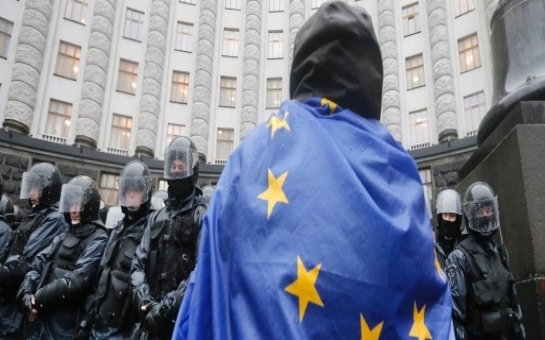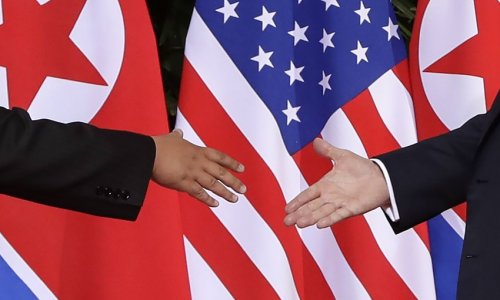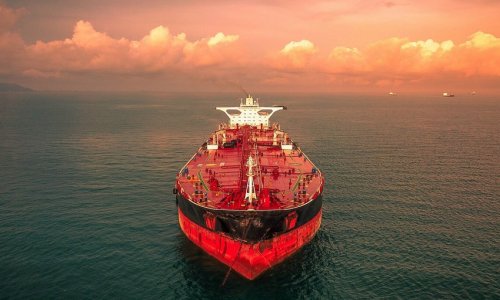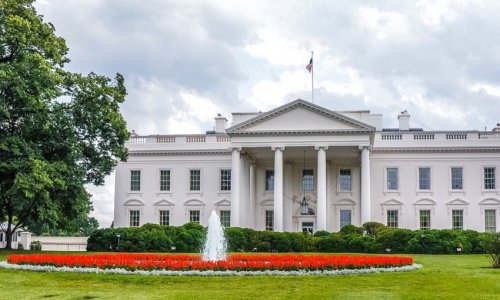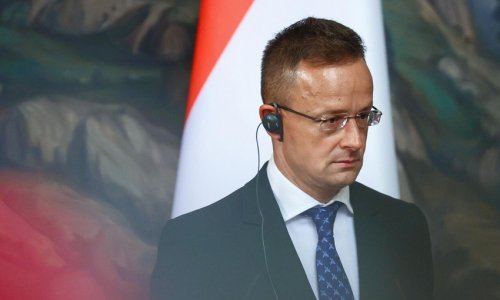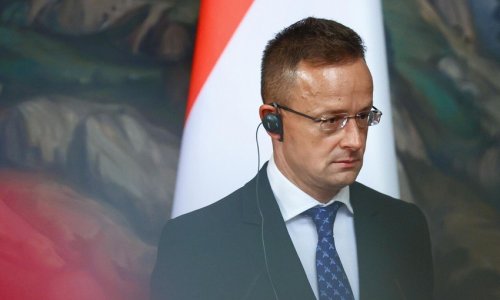By SPIEGEL Staff
This is why Yanukovych needs the Putin who in recent months has made the consequences of an EU deal unmistakably clear to Ukraine. In August, Russian officials began painstakingly inspecting trucks from Ukraine bringing goods across the border into Russia. Ukrainian oligarch Viktor Pinchuck was barred from importing steel pipes to Russia, and a former cabinet minister was prevented from selling his chocolate in the country.
These measures have led to a 25 percent decline in exports since 2011. Ukraine exports a third of its goods to Russia and other former countries of the former Soviet Union, and only 25 percent to the EU. Russia also threatened that it would require Ukrainians to apply for visas to travel to the country in the future.
Three days after the secret meeting in Moscow, Ukrainian oligarchs, apparently in consultation with the Kremlin, asked Yanukovych to postpone signing the EU association treaty by a year.
Zurkov the Manipulator
The Kremlin made it clear the harassment could become permanent. Sergei Glazyev, Putin's advisor for the economic reintegration of the republics that gained their independence after the collapse of the Soviet Union, predicted that Kiev would experience an "economic disaster" if it signed the agreement with the EU. "Ukraine is sacrificing its sovereignty," he said threateningly at a conference on the Crimean Peninsula, which is former Russian territory.
Vladislav Surkov -- the Kremlin's former main ideologist, who had fallen out of favor but was brought back by Putin two months ago -- was sitting in one of the back rows. His mission was to help Moscow regain its control over the countries of the former Soviet Union.
When someone like Zurkov appears at a meeting, it means intrigues are under way. In Russia, Zurkov has founded parties and let them fade away based on Putin's needs. He could do the same thing in Ukraine, by siphoning off Yanukovych's pro-Russian voters and all but destroying Yanukovych's chances of reelection.
It is unclear whether Putin had to voice all of these threats in his meeting with Yanukovych. It was probably no longer necessary. Yanukovych had already understood that his only hope for political survival was to throw in his lot with the Russians.
The threats were also accompanied by promises. Putin held out the prospect of loans, lower gas prices and debt forgiveness with Russian energy giant Gazprom, to which Ukraine owes $1.3 billion.
Pipeline Under Threat
Another project could suffer a fate similar to that of the association agreement: a natural gas contract, negotiated under the auspices of the EU, which was supposed to be signed on Nov. 22. Once again, everything seemed to have been agreed upon, but then the Ukrainians were suddenly saying minor technical details had yet to be ironed out. "This has already been going back and forth for a year now," says one of the frustrated lead negotiators.
Everyone had expected the agreement to be signed, because it would have enabled the Ukrainians to liberate themselves, gas-wise, from the clutches of the Russians, especially as they now pay significantly more for Russian gas than major Western companies, such as German energy conglomerate RWE. Under the new agreement, pipelines in EU member-state Slovakia would be rebuilt to allow for reverse gas flows, so gas destined for Western Europe could also be transported to Ukraine in the future.
But Yanukovych is hesitating. Because of the necessary upgrading work, the gas from the West could not begin flowing to Ukraine until next September. This would make the Ukrainians vulnerable to blackmail, at least this winter. And the negotiations over the new contract already seem to have helped Yanukovych, with the Russians signaling significant price cuts for Ukraine. It appears Yanukovych has played his cards right once again.
That is, if he can contain the political anger within Ukraine. On Sunday, the largest demonstration in the country since 2004's Orange Revolution took place in Kiev. According police estimates, 23,000 people protested the withdrawal from the EU pact negotiations, including boxing champ Vitali Klitschko. Organizers place the number at over 100,000. Yulia Tymoshenko's daughter, Eugenia, personally reached out to Angela Merkel for help in an interview with Germany's Bild tabloid, saying that, if nothing was done, her mother would die.
What Now?
In Brussels, European Commissioner for Enlargement Stefan Füle tried to compose himself last Friday. "Only when the summit officially begins will we know, once and for all, whether or not Ukraine intends to sign." But no one expects a quick agreement anymore. Even Füle is already thinking about possible next steps. He also seems somewhat at a loss when he says that the EU has no interest in engaging in a competition with Russia -- as if one hadn't already happened.
"It's difficult to say when the negotiations will be resumed," says middleman Kwasniewski. The European Parliament will be elected next year, there will be changes at the European Commission, and a presidential election in Ukraine in 2015. "It seems to me that the pause is going to be longer rather than shorter," Kwasniewski adds.
Translated from the German by Christopher Sultan
ANN.Az

